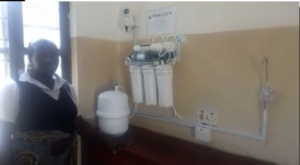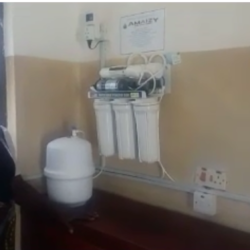The “Sanganigwa Children`s Home” orphanage is situated in Kigoma, one of the most isolated and undeveloped areas of Tanzania. It gives hospitality to children and teenagers from 4 to 24 years old (the age of the orphans is more or less approximate due to the lack of documents regarding the birth of each child). The children belong to different ethnic and religious groups, and most of them are orphans because of AIDS.
Some children arrived at the Sanganigwa centre after they had been living on the streets, where they put up with the most humiliating and hardest jobs. The children and teenagers who are orphans or abandoned are reported by the police or the local Catholic Church, when nobody is able to take care of them. Sometimes they still have relatives, but they are extremely poor and in many cases they are already taking care of other children of the family.
Sanganigwa is under the jurisdiction of the local Catholic church and it is owned by the Tanzanzian Government. It was founded in 1995 by the educator Astrid Jangaard thanks to the financial support of NORAD (Norwegian agency for cooperation and development) and by Archbishop Paul Ruzoka of the Kigoma Diocese. In 1997 it felt into a dramatic economic crisis.
In 1998 Daniela De Donno Mannini, founder of the non-profit organization “The Jane Goodall Institute Italia ONLUS” (JGI Italia), took responsibility for the orphanage and started a distance adoption program in Italy, to support the children of Sanganigwa. Since then, the project is alive thanks to the financing of those who, sensitive to solidarity, want to contribute to the children’s maintenance. Today, the Italian JGI provides the Home with medical assistance, food, recreational and cultural activities (choir, acrobatics), school education (primary, secondary, college, vocational training), environmental education and private tuitions. Moreover, we support the salaries of the Sanganigwa centre workers each of whom has a numerous family to maintain.. We built a play ground, a welding workshop, and started specific small-scale breeding projects for cows, chicken, and ducks. We take care of maintaining the structures, carry out community surveys, psycho-pedagogic assistance, community integration, and planning the entry of boys and girls in the working life. We provide Sanganigwa with clothes, shoes, linen and scholastic materials. More activities are carried out by our Organization to guarantee an optimal functionality of the House, for which the JGI Italia is helped by Italian public Institutions. For example, an infirmary and a library have just been opened through the support of Regione Puglia; we have a tailor’s project addressed to Kigoma street-children, with the contribution of the City Hall of Pelago (Florence); we are active on the side of children rights, and we organized a seminar with the support of Livorno’s Province addressed to the local authorities, and to the other attaining associations, developing a network on the territory on children rights.
Coordinated by the social worker Kenneth Hageze, the orphanage consists of a kitchen (with charcoal cooker) joined to the refectory, a classroom, four dormitories with bathroom, a office, two storerooms, a building that is currently been restored in order to be used as an infirmary, a lodging for four nuns, a lodging for two social assistant (who are husband and wife), a stable outside the house and a hen-house. From Monday to Friday children attend school, some of them in the town of Kigoma, others in one of the bordering towns. After lunch they study with some teachers employed by us to integrate their school curriculum; afterwards children take care of their surroundings: they look after the domestic animals, they learn to cultivate vegetables or to do housework. Children with relatives still alive get in touch with them, and once a year they have the possibility of going back to their villages. This is organized by us in order not to loose their family ties and to make the reintroduction in their community easier. After the primary school (that lasts seven years) we direct children towards the secondary or the technical school (vocational training), depending on their ability. They have the possibility of becoming electricians, mechanics, carpenters, dressmakers, etc… In Kigoma there aren’t any technical schools: for this reason girls and boys who attend these schools catch the train everyday or, most of the time, they sleep in lodgings annexed to the schools. In these cases we pay a fee and supply the girls and boys with all they need, even money to buy soap, hygienic wipes, razors, etc. After secondary school, boys and girls can decide to join a college, such as: tourism, nautical, art. Periodically they come back to the Sanganigwa centre, their home. After they finish school we buy them all they need to start a job (a sewing machine, tools for carpenters, electricians, etc.) and we pay the rent of a room in a family for a whole year. We also buy a mattress, a table and a chair.
The most widespread diseases among children of this area are dermatitis, intestinal infections, respiratory infections, malaria and typhus. Malaria, in spite of mosquito-nets, strikes children even three or four times a year. It’s not always necessary to take children to the hospital every time, as the testing can be carried out at the nearest clinic (on payment) and the disease can be treated at the Sanganigwa centre. After treatment, the children need a long convalescence period to fully recover. Over the last years typhus has became more frequent and strikes scholastic age children. We think that they are infected at school, where they drink un-boiled running water.
We buy AIDS medicines at Tanga Town (about 1800 km from us). Medicines are mailed to us monthly.
Most of the children have seen their parents die from AIDS, in other cases they were neglected or nobody knows if their parents are still alive. Sometimes they have been living with a relative who was unable to bring them up: many often they were left alone all day long without food, or they have been living with prostitutes or criminals who abused them. One of our children saw his mother killed for ethnic reasons. Children who suffered for these reasons need psycho-pedagogical support. We found this support in the Italian volunteer Francesca Chiellini who works with the children for three months each year. We consider continuing with this practice very important, because is the only way for children to overcome their traumas, to develop their self-esteem, to strengthen their personalities.
Furthermore, Sanganigwa is a concrete and important place where homeless children come (about 280); they all come from Kigoma and we try to involve them in social activities (choir, acrobatics, psycho-pedagogical program). We hope in this way to keep them busy and to give them a chance. In case of medical emergencies or urgent surgery we try to do our best by intervening and sometimes we contribute by giving them food.
Sustaining the project in the long term
After having guaranteed basic support and education, the construction of family houses is planned to guarantee that the children grow in an environment similar to that of a real family (instead of dormitories, refectory and communal rooms).
We also plan to create new work opportunities (such as soap and paper manufacturing), and to construct and organize workshops for dressmakers, arts and crafts, clock repairers, and also for repairing tires, bicycles, soldering, carpentry, etc..
The Sanganigwa centre needs a food and drinks area and shops to sell merchandise and to offer professional competences in order to make the Sanganigwa centre autonomous.
Helping Sanganigwa – distance sponsorship programme
The daily running of the Sanganigwa orphanage is possible thanks to the distance sponsorship programme, launched in 1998 by JGI Italy, which targets private citizens. The donors, who are all Italian, receive a six-monthly or annual update on the progress of the children’s home, a photo and a drawing. In addition specific donations allows us to realise individual projects, for example: the renovation of the buildings, the animal enclosures, the playground, the “duck” project, the workshop for welding, the library, the infirmary, the psycho-pedagogic project to help the children overcome trauma and develop self respect, and seminars on children’s rights that involve the community as a whole. Over the years the Nando Peretti Foundation (NPF) has made an extremely valuable contribution to the work of JGI Italia for the Sanganigwa Children’s Home. Moreover, the NPF, together with three other private Italian donors, will play a part in the construction of ten family houses, which will replace the current dormitories.
The demands for the adequate growth and maintenance of Sanganigwa are still numerous: workers need to be kept up-to-date, we must assure psycho-pedagogical support to the children all year round, we should increase the staff, we need a bus to be able to transport the children and also to transport hay for the cows and coal for cooking. We have to install a solar heating system (electricity and cookers), to undertake a socio-economic study focusing on the labor demands in the region, in order to favor our girls and boys after studies or training. We need to create new opportunities for them such as paper and soap manufacturing, shoe making, etc., to create workshops for the sale of merchandise with the aim of making the centre autonomous.
Moreover, we must guarantee a better life for street-children. The JGI Italy plays an active role in supporting the street children of the city both through training programmes and micro credit projects as well as direct humanitarian aid (medical assistance and food).
The project concerning the Kigoma street children still requires the basics (buildings, food, medical care, education).
To allow the children’s home to function properly, and for the sake of the children themselves, visits are discouraged by all the partners in the project. Sadly, due to the invasiveness of western tourists, the Sanganigwa staff have been obliged to say that the orphanage is not a zoo. The privacy and safety of the children are as important for us as their healthy and peaceful development. Under certain circumstances visits to the children’s home can be arranged with the project partners as a direct consequence of the sincerity of the donor and the specific project presented and supported.
In the children to eat well, go to school and receive medical treatment is essential guarantee continuity to our project and contribute monthly to the orphanage’s expenses.
Donate 132 euro once a year
(PayPal donation system)
Donate only 11 euro every month
(PayPal system donation: the system will automatically take 11 euro every month for exactly 12 months)
You decide the amount you want to donate
(PayPal system)

















































